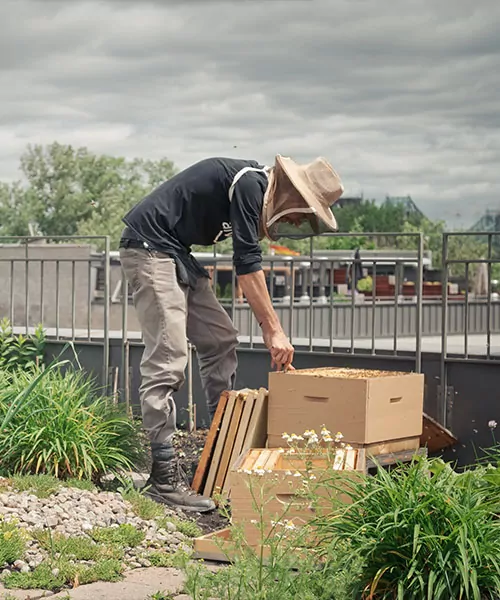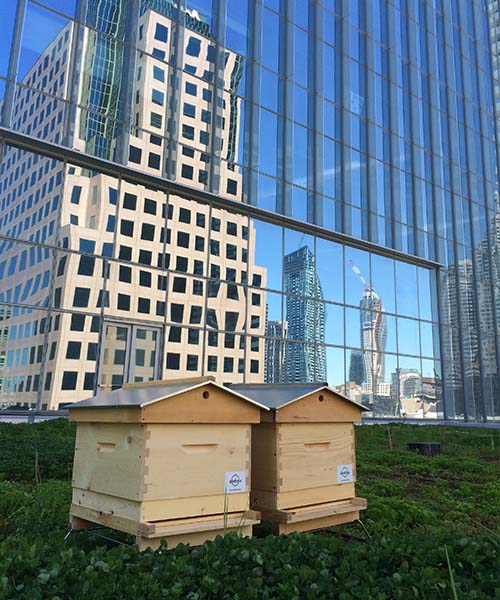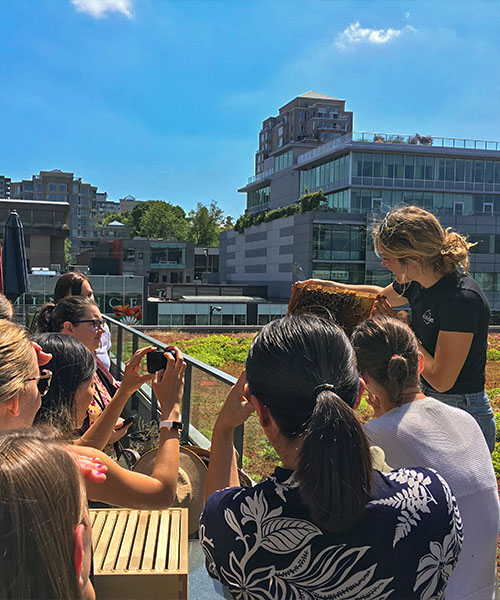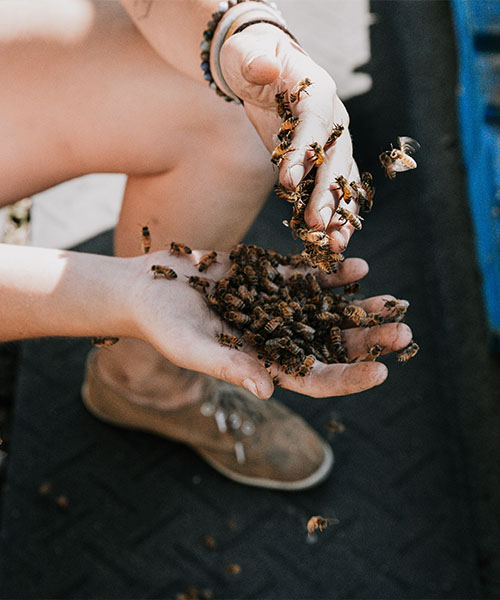How Buildings Can Benefit From Urban Beekeeping
What have you eaten today? Chances are at least part of what was on your plate exists thanks to bees – and we’re not just talking honey.
What’s happening to pollinator populations?
- Across the world, we can observe increased evidence that pollinating animals are getting decimated due to loss of habitat, pesticides, the introduction of invasive plant and animal species, diseases, and parasites;
- A large percentage of pollinators are facing endangerment;
- North America has lost over 50% of its commercial honey bee colonies over the last decade.
-

-
Why Should we Bring Bees into Cities?
In an urban setting, fostering a connection to nature could encourage citizens to protect and help our winged friends by planting wildflowers and other plants accordingly, expanding their view of the environment and taking into account all the tiny creatures with whom we share our world. The docile (and sweet!) European honey bee can act as a great ambassador for the thousands of other bee species!
At Alvéole, our goal is to make everyone fall in love with all bees (and all pollinators, really!). By bringing people closer to these inspiring creatures, we build bridges that lead to an increased understanding of the importance of bees and of the major role that they play in our food and ecosystems. By educating, inspiring wonder and reconnecting people in cities with nature, we believe that we can make a real difference, one hive at a time.
Bees Have Environmental and Social Impacts on Your Community and Building
Increasingly, buildings of all stripes — schools, office buildings and even malls — are choosing to launch green initiatives through urban agriculture and green roofing, as they represent easy-to-implement and sustainable solutions towards minimizing the negative impacts of urbanization. Urban farming and greening projects increase biodiversity in the neighborhood, while fostering a sense of community and belonging amongst your team and tenants.
Research finds that by 2030, urban development is expected to triple what it was in 2000, and with urban development, unfortunately, comes ecosystem destruction. But, by developing greener action plans, your organization can do its part to mitigate the negative effects of urbanization. Urban greening projects have the potential to mitigate urban heat island effect, contribute to positive mental health and create habitat. In fact, a study conducted by a team of researchers in Australia found that green spaces in urban areas promoted the return of several insect and plant species to the area of study that had been considered functionally extinct due to urban sprawl!
-

-
Supporting Biodiversity Around Your Property
Did you know that bees can travel a distance of up to 3 mi (5 km) around their hive to forage for nectar and pollen? By analyzing samples from their hive, we can actually determine which flowers are blooming in the area and which ones are missing. This information can be used to grow a bee-friendly garden to better support biodiversity and ensure your bees are getting the food they need – and create a beautiful green space for your community to enjoy!
-

-
Uniting Towards a Collective Goal
Installing beehives in the workplace creates a unique way for your community to connect and collaborate. A honey bee hive has a way of not only connecting people to their bees, but also to their building’s community. Whether by following its growth online, or participating in workshops, interacting with a beehive contributes to a sense of purpose and connection… Not to mention all the other extra sweet perks that come with it, such as being inspired by a new hobby or enjoying hyper-local honey from their own communal hive!
-

-
Raising Environmental Awareness
Your team will soon discover that bees are fascinating creatures. By investing in urban beekeeping and taking advantage of our interactive workshops, you’ll help them connect with nature, fall in love with bees, and become more familiar with the importance of pollinators in the balance of our ecosystems. Moreover, you’ll be able to share the story of your building’s hive, share its by-products — yes, this also means honey! — and become a trailblazer by fostering environmental awareness.
Ready to make a difference in your industry with urban beekeeping? Get Started